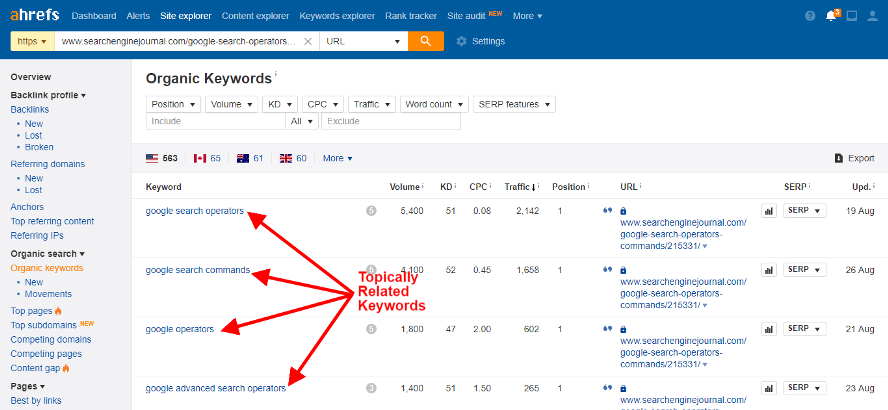Are you looking to increase the amount of traffic going to your website? Is Google Analytics revealing that your organic traffic is too low for your liking? Do you need help creating an SEO strategy that will actually rank your pages at the top of the SERPs for relevant, high-search volume keywords?
Congrats! You’ve come to the right place.
Here’s a guide on how you can turbocharge your SEO by focusing on topics, not keywords:
The Old Way of Doing Keyword Research
Although it’s still important to analyze the quality of the keywords you’re optimizing your pages for, the old way of keyword research is officially dead and gone.
Yes, it’s crucial to make sure that keyword search volume, difficulty, and level of competition are worth the time and effort you will spend creating and optimizing the content required to outrank your competitors. If the keyword search volume is very low but specialized to a target audience, it may be worth it to develop a new piece of content around that keyword. If the search volume is very high but broad in nature, you might want to pick something else to write about. However, there’s a new way to do “keyword research” now, and that way is called topical research.
Topical research involves the topics you’ll be covering in your content rather than the keywords you’d be inserting. It’s all about ensuring your content is topically relevant and not just keyword optimized. The good news is that topical research can be completed quickly and doesn’t require much skill. All you need are the right SEO tools, a little bit of time, and a website that you’re ready to post quality content to.
Read Also: How to Uncover Content Marketing Techniques from Competition
How Does Google Measure Topical Authority?
We all know that Google’s algorithms are ever-changing. Well, quality content is still in style and extremely important… and according to the changes made over the past ten years, I strongly believe it’s here to stay.
A topical authority is measured by topic relevance and how in-depth that topic is covered within a piece of content. According to Market Muse, “Google automatically determines the topics and keywords for which you have authority. Then they decide what keyword searches you’re going to rank for, based on the previously determined quality.”
Your piece of content must prove that you’re an expert in whatever you’re discussing. Whether you’re covering how to take care of your pet bird or the best gifts to give your significant other for Valentine’s Day, it’s vital that you include everything the reader needs to know to fully understand the answer to their question. Be sure to answer the main question, cover the general category and subcategories related to the topic at hand, and anything else that might help to provide him/her with the best possible value.
So how do you create content that Google (and readers) will consider topically relevant AND high authority?
Developing Long-Form Content by Hacking the Competition
“Hacking the competition” sounds black hat, but I promise you it’s not. Competitive research is part of any quality SEO strategy. Analyzing what your competitors are doing (more specifically what your most successful competitors are doing) will enable you to learn and understand what works, what doesn’t work, and what you should and shouldn’t focus your time on based on another company’s experience. Why should you waste your time when your competitors have already done the work for you? Learn from them so you don’t have to make those mistakes yourself.
So how exactly do you “hack” your competition to save your precious time and energy?
With the availability of helpful tools like SEMRush, Moz, and Ahrefs, the process has become way easier and more time-saving than ever before. Start off by finding out what your competitors are ranking for by punching in their domain into the site explorer feature on any of these sites. Analyzing the list that pops up will let you see which pages of their rank for multiple different keywords. You will start to see groups of similar long-tail keywords that are associated with those pages, which will ultimately become your content topics.

Once you combine those topics into a more organized list, it’s time to enter them into Google. See which pages rank on the first page for which topics, check out what the pages look like, then formulate a plan on how you can outrank them with better, higher quality, more valuable content.
For more information on how to perform strong SEO topical research, here’s a great video to watch that will teach you how to do it in further depth.
Building an Evolved Content Strategy
Building an evolved content strategy is composed of multiple parts. However, all good content strategies follow this simple process:
- Create a list of relevant topics to develop content around
- Analyze those topics and discover their quality level and related keywords
- Do the necessary research to cover topics in full depth
- Create different types of content, including blogs, images, videos, audio, etc.
- Carefully craft your content titles to grab your reader’s attention
- Optimize your content in a way that will engage your target audience
- Measure what works and what doesn’t by analyzing data using tools and programs
- Keep doing what works and forget about what doesn’t work
As mentioned before, it’s not about creating content centered around keywords anymore. It’s about creating content revolving around answering questions and addressing topics that your target audience is researching. It’s up to you to take these topics and develop content around them to engage your unique readers in a way that inspires them to complete an action, like subscribe to your newsletter, purchase your products, or sign up for your service.
An evolved content strategy is multi-faceted and complete with different forms of content.
Whereas some of your readers enjoy reading blogs, some of them prefer to listen to a podcast. You must develop a strategy that caters to your entire audience in a variety of ways, through video, audio, imagery, and writing. If you only develop one form of content, you’re missing out on the opportunity to cater to those followers of yours who engage differently.
The Importance of Creating a People-Centric SEO Strategy

At the end of the day, the most successful SEO strategies are not created for search engines — they’re developed for people.
According to founder & CEO of AudienceBloom Jayson Demers, “making your content marketing strategy more customer-centric won’t happen overnight, and there’s a fine line between customer-centric and revenue centric, so don’t expect a “light switch” operation here. It will take you some time to figure out exactly what your customers want, what you’re currently giving them, and how to improve your strategy so that both you and your customers benefit. But if you can do this, while avoiding the pitfalls, I can almost guarantee you’ll see a higher level of return on every piece you produce—especially since you’ll differentiate yourself from the competition.”
Ultimately, real human beings are the ones reading and engaging with your content. No matter how optimized your pages may be, and no matter how many keywords are perfectly placed in H1s and H2s, if they don’t serve the needs of the people visiting those pages, then you’re wasting your time.
Focus on creating topically relevant content that your target audience will read, enjoy, appreciate, and share. People-centric content is what will take your SEO strategy to the next level, get your content ranked at the top of the search engines, and increase your traffic and revenue.
I hope this guide will help you optimize and turbocharge your SEO strategy by focusing on topics and not keywords. Remember to do the necessary research to find out what you should write about then set out to create high quality content that’s engaging, relevant, and suited for people and search engines. You will be rewarded by Google and your audience as a result.
Author Bio:
Cory Young is a Digital Marketer with 10+ years’ experience developing SEO and Paid Search strategies for Fortune 500 companies. Cory is the founder of BCC Interactive, a digital marketing agency in Philadelphia, PA that specializes in developing strategies to help businesses grow through organic search.
